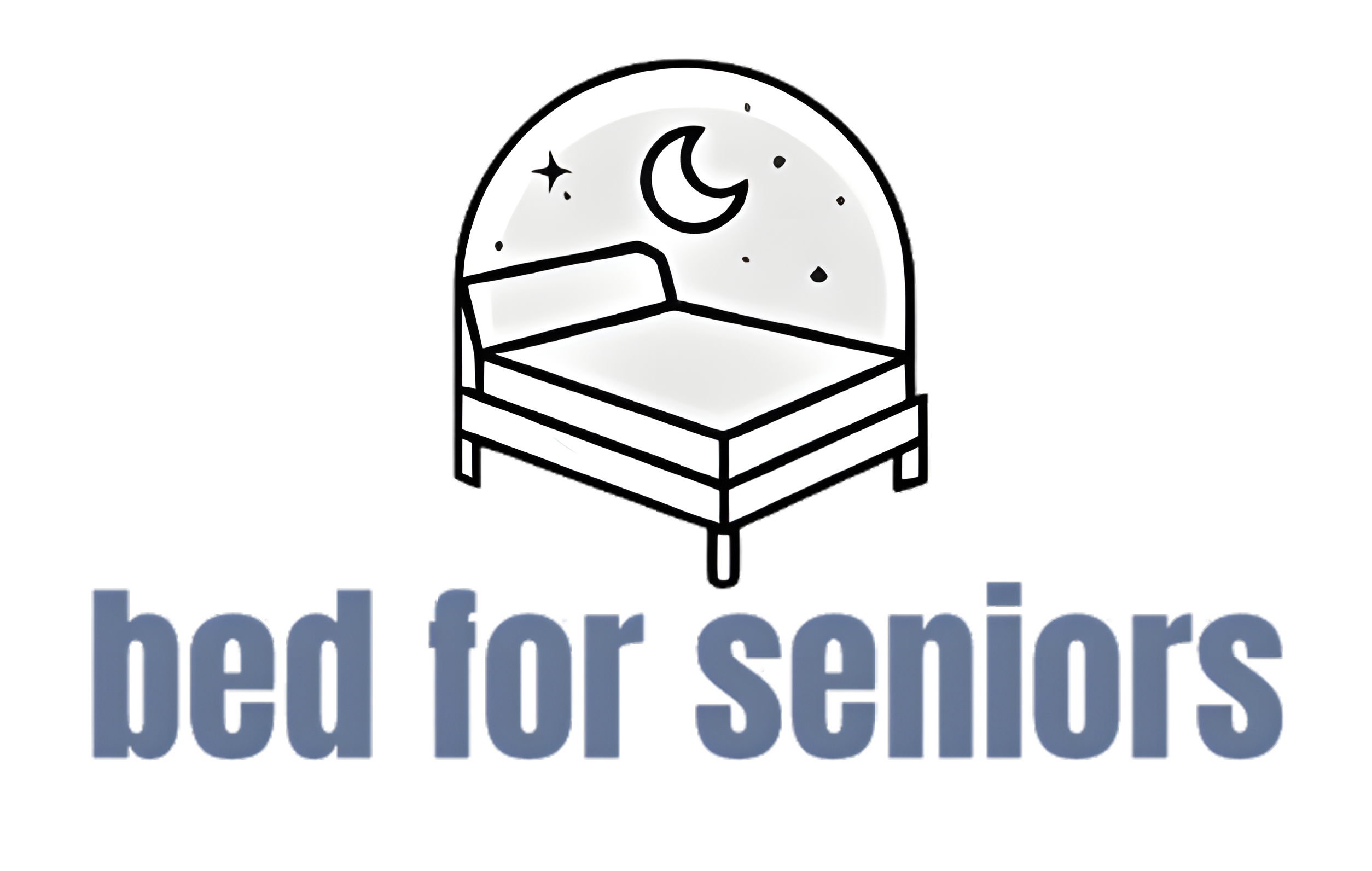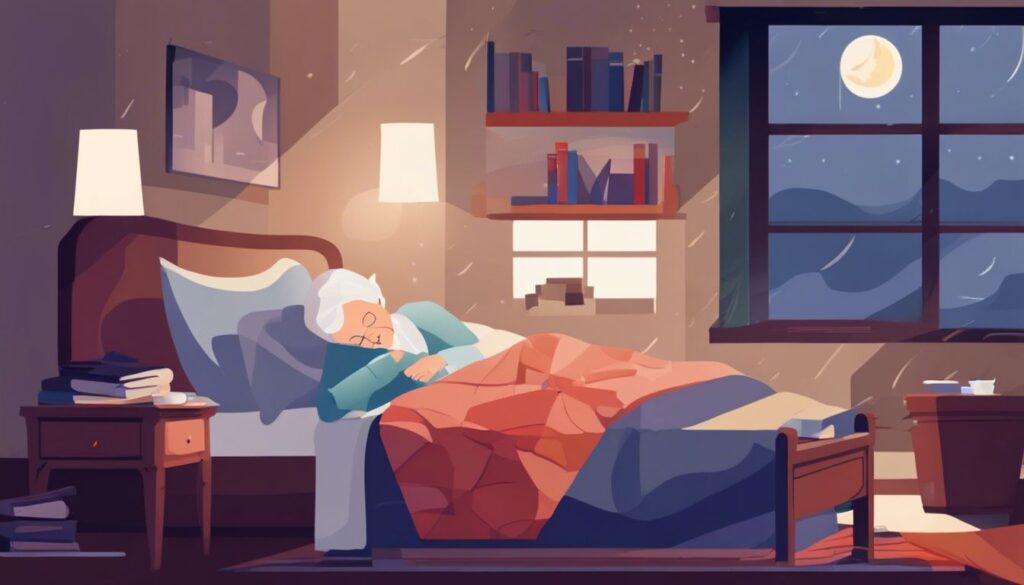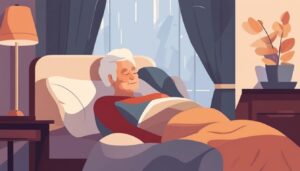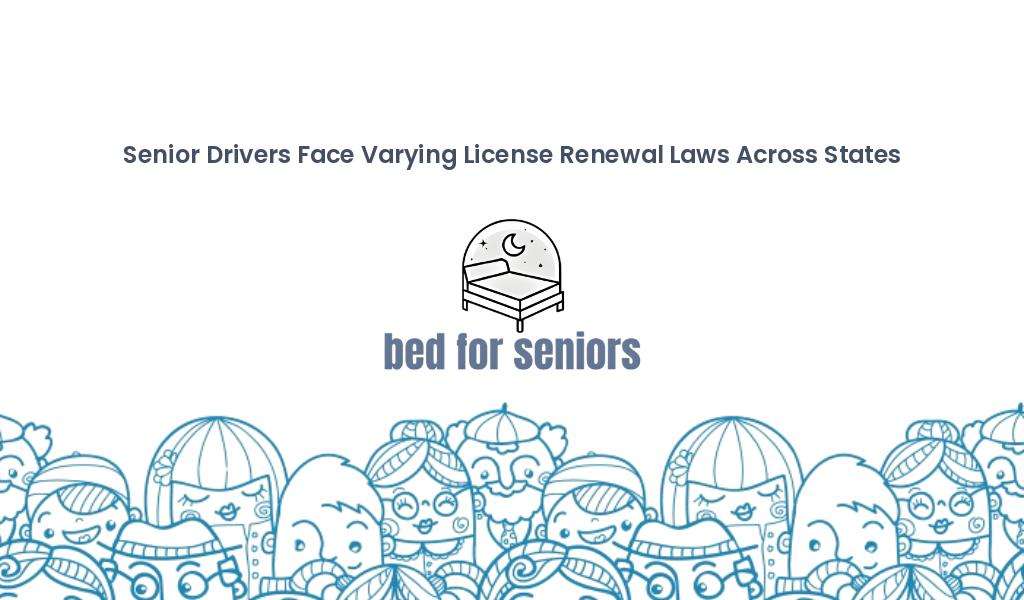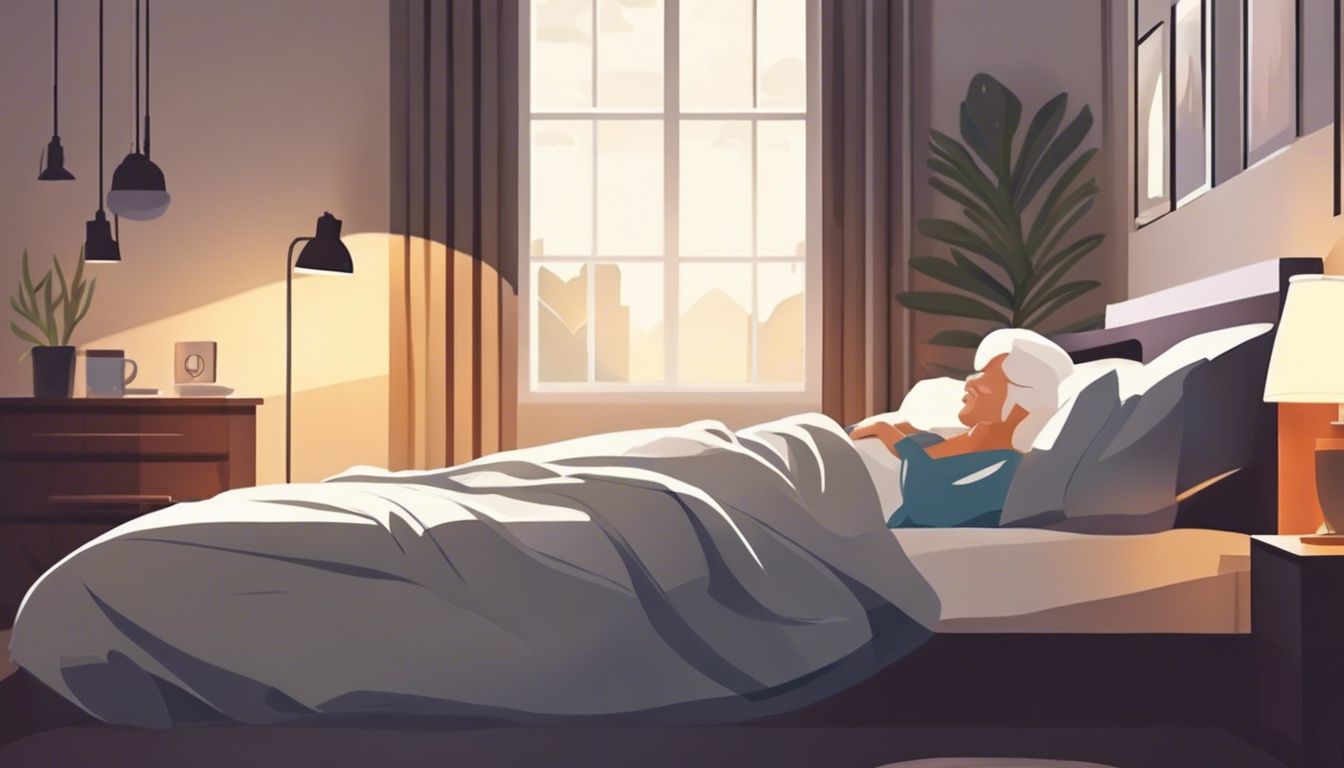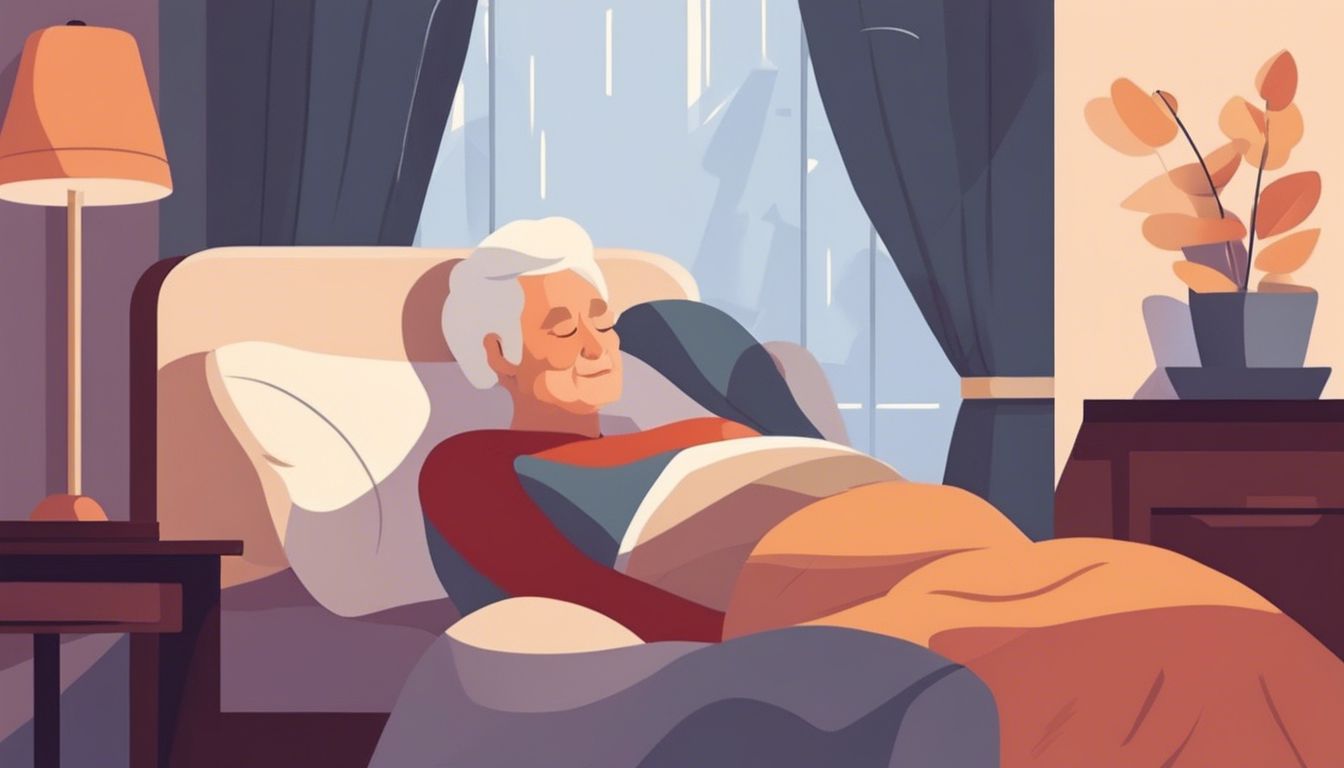Many older adults struggle with sleep issues as they age. Research shows that aging causes changes in sleep patterns, including more frequent nighttime awakenings. This article will explore common sleep problems in seniors and offer practical tips to improve sleep quality.
Ready for better rest?
📋✅
- As people age, they often experience changes in sleep patterns, including more frequent nighttime awakenings and early morning risings.
- Common sleep issues for older adults include insomnia, frequent waking, and early morning awakening, which can be caused by health conditions, medications, and lifestyle factors.
- Health conditions like neurological illnesses, chronic pain, and sleep apnea can significantly impact sleep quality in seniors.
- Limiting alcohol and caffeine intake, avoiding long or late-day naps, and creating a sleep-friendly environment can help improve sleep for older adults.
- Caregivers can support better sleep for seniors by establishing consistent sleep schedules, encouraging relaxation before bed, and working with healthcare providers to address underlying issues.
Common Sleep Issues in Older Adults
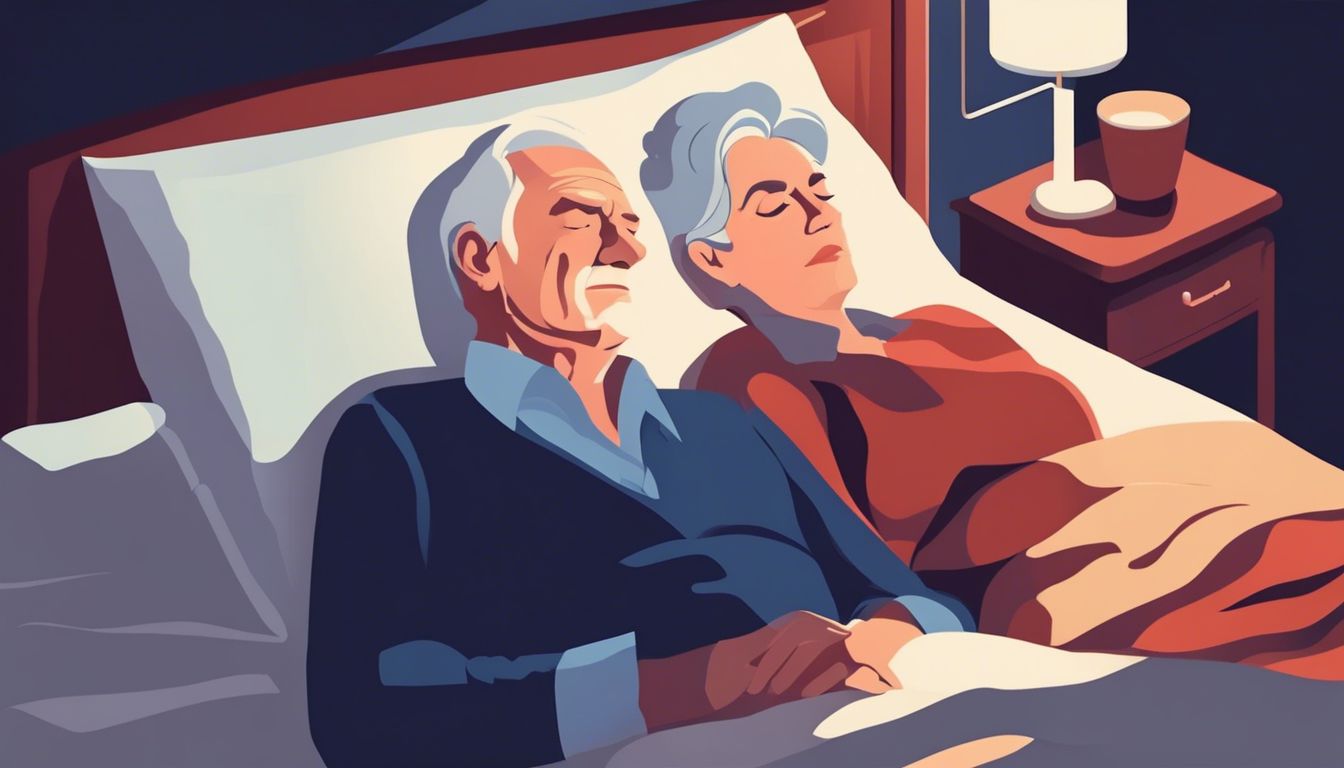
Older adults often face unique challenges when it comes to getting a good night’s rest. Many seniors struggle with falling asleep, staying asleep, or waking up too early – issues that can impact their daily lives and overall health.
Insomnia
Insomnia plagues many older adults, disrupting their sleep patterns and overall well-being. This common sleep disorder makes it hard to fall asleep, stay asleep, or both. Seniors often experience chronic insomnia, lasting for months or even years.
The effects can be far-reaching – daytime fatigue, mood changes, and decreased cognitive function are just a few consequences.
Sleep medicine specialists recognize various factors contributing to insomnia in the elderly. Medical conditions like arthritis, heart disease, and sleep apnea play a role. Medications, particularly antidepressants and stimulants, may also interfere with sleep.
Lifestyle habits such as irregular sleep schedules and excessive napping can exacerbate the problem. Addressing these underlying issues is crucial for improving sleep quality in older adults.
Sleep is the golden chain that ties health and our bodies together. – Thomas Dekker
Frequent Waking
Building on the issue of insomnia, another common sleep challenge for older adults is frequent waking during the night. This disruption often stems from changes in sleep patterns that naturally occur with age.
Older individuals may find themselves waking up several times throughout the night, sometimes as often as 3-4 times. These awakenings can be brief, but they fragment sleep and reduce overall sleep quality.
Several factors contribute to this frequent waking in seniors. Physical discomfort, the need to use the bathroom, or environmental disturbances like noise or light can all play a role.
Changes in circadian rhythms and a decrease in deep sleep stages also make older adults more susceptible to nocturnal awakenings. Caregivers should be aware of these normal age-related changes and work with their loved ones to create a sleep environment that minimizes disruptions and promotes restful slumber.
Early Morning Awakening
Early morning awakening plagues many older adults. They often find themselves wide awake at 4 or 5 AM, unable to drift back to sleep. This common sleep issue stems from changes in the body’s internal clock as we age.
Our circadian rhythms shift, causing earlier sleepiness in the evening and earlier waking.
For caregivers, understanding this change is crucial. It’s not just about going to bed earlier – the entire sleep cycle has moved forward. Helping seniors adjust their routines can improve sleep quality.
Setting a consistent bedtime and wake-up schedule may alleviate some early morning awakenings. Next, we’ll explore how health conditions influence sleep in older adults.
Health Conditions Influencing Sleep in Seniors
Aging brings changes to our bodies that can affect sleep quality. Many health issues common in seniors, like arthritis or heart problems, can make it harder to get a good night’s rest.
These conditions often cause discomfort or require medications that interfere with normal sleep patterns.
Neurological Illnesses
Neurological illnesses can significantly impact sleep patterns in older adults. Conditions like Parkinson’s and Alzheimer’s often lead to sleep disruptions, making it harder for seniors to get restful nights.
These disorders affect the brain’s ability to regulate sleep-wake cycles, causing issues like frequent nighttime awakenings or daytime drowsiness.
Sleep problems in neurological patients aren’t just inconvenient—they can worsen symptoms and quality of life. For instance, Parkinson’s patients might experience REM sleep behavior disorder, acting out their dreams physically.
Alzheimer’s sufferers often face sundowning, becoming more confused and agitated in the evening. Caregivers should be aware of these potential issues and work with healthcare providers to manage sleep disturbances effectively.
Pain and Discomfort
Moving from neurological concerns, we shift our focus to a common issue affecting seniors’ sleep: pain and discomfort. Chronic aches often disrupt rest, making it hard for older adults to fall asleep or stay asleep through the night.
Age-related conditions like arthritis, back problems, acid reflux, and diabetes frequently cause discomfort that interferes with quality sleep.
Caregivers can help manage pain-related sleep issues through various approaches. Physical therapy might improve mobility and reduce discomfort. In some cases, surgery could address underlying problems.
Over-the-counter or prescription pain relievers may also provide relief. It’s crucial to work with a healthcare provider to find the right balance of treatments, ensuring pain management without compromising overall health or creating medication dependencies.
Sleep Apnea
Sleep apnea poses a significant health risk for older adults. This sleep disorder causes breathing to stop and start repeatedly during the night, disrupting rest and potentially leading to serious health issues.
After age 40, the likelihood of developing sleep apnea increases markedly. Symptoms often include loud snoring, gasping for air during sleep, and daytime fatigue.
Proper diagnosis and management of sleep apnea require medical intervention. A doctor can order a sleep study to confirm the condition and determine its severity. Treatment options may include lifestyle changes, continuous positive airway pressure (CPAP) machines, or in some cases, surgery.
Caregivers should be alert to signs of sleep apnea in their loved ones and encourage them to seek professional help if symptoms arise.
Lifestyle Factors Affecting Sleep Quality
Daily habits play a big role in how well we sleep at night. What we eat, drink, and do can make or break our rest. Keep reading to learn more about these important factors.
Medications
Older adults often take multiple medications to manage various health conditions. This polypharmacy can significantly impact sleep quality and duration. Many common drugs, including antidepressants, beta-blockers, and diuretics, may interfere with normal sleep patterns.
Some medications can cause daytime drowsiness, while others might lead to nighttime wakefulness.
Caregivers should work closely with healthcare providers to review and adjust medication regimens. A thorough evaluation can identify drugs that might be disrupting sleep and explore alternatives.
Sometimes, simple changes like adjusting dosage times can make a big difference in sleep quality. It’s crucial to never stop or change medications without professional guidance.
Alcohol and Caffeine Consumption
Alcohol and caffeine can significantly impact sleep quality in older adults. Drinking alcohol may lead to falling asleep faster, but it often causes disruptions later in the night.
This results in fragmented sleep and less restorative rest. Caffeine, found in coffee, tea, and some sodas, acts as a stimulant. It can make falling asleep more difficult and reduce overall sleep quality.
Experts recommend avoiding caffeine for at least 6-8 hours before bedtime to minimize its effects on sleep.
Both substances can exacerbate existing sleep issues common in seniors, such as frequent waking or early morning awakening. Limiting or eliminating alcohol and caffeine consumption, especially in the evening hours, can help improve sleep patterns.
Caregivers should be aware of these effects and encourage healthier alternatives like herbal tea or warm milk before bed. The next section will explore how napping habits can influence nighttime sleep in older adults.
Napping Habits
Moving from caffeine and alcohol habits, let’s consider another aspect of sleep: napping. For caregivers, understanding napping habits in older adults is crucial. Short naps can be beneficial, offering a quick energy boost.
However, long or late-day naps often interfere with nighttime sleep routines.
Experts recommend limiting naps to 20-30 minutes and avoiding them after 3 PM. This helps maintain a healthy sleep-wake schedule for seniors. Caregivers should monitor napping patterns and adjust as needed.
Too much daytime sleeping might signal underlying health issues or medication side effects. It’s important to strike a balance between rest and maintaining good nighttime sleep quality.
Tips for Improving Sleep in Older Adults
Improving sleep in older adults requires a multi-faceted approach. Simple changes to daily routines and sleep environments can make a big difference in sleep quality for seniors.
Enhancing Sleep Hygiene
Good sleep hygiene is key for older adults’ rest. It involves creating habits that promote quality sleep. Caregivers can help seniors stick to a regular sleep schedule, even on weekends.
This helps regulate the body’s internal clock. Limiting caffeine and alcohol, especially in the evening, can also improve sleep quality.
Setting up a relaxing bedtime routine is crucial. This might include reading, gentle stretching, or listening to calm music. The bedroom should be cool, quiet, and dark. Comfortable bedding and pillows make a big difference too.
Regular exercise during the day can lead to better sleep at night, but it’s best avoided close to bedtime.
Adjusting Sleep Environment
Creating a sleep-friendly environment is crucial for older adults. Dim lighting and a cool room temperature promote better rest. Remove TVs, smartphones, and other bright screens from the bedroom – these can disrupt sleep patterns.
Safety matters too. Keep a phone and emergency numbers within reach. Install nightlights or motion-sensor lights to prevent falls during nighttime bathroom trips. Clear the floor of any obstacles that could cause tripping.
Comfort plays a big role in sleep quality. Invest in a supportive mattress and pillows that ease joint pain. Use blackout curtains to block out street lights. White noise machines can mask disruptive sounds.
For seniors with restless legs syndrome or periodic limb movement disorder, extra leg room in bed might help. These small changes can make a big difference in sleep architecture and total sleep time for older adults.
Consulting Healthcare Providers
Healthcare providers play a crucial role in addressing sleep issues for older adults. They can assess underlying health conditions, review medications, and recommend appropriate treatments.
Geriatricians, specialists in elderly care, offer valuable insights into age-related sleep changes and potential solutions. These experts may suggest cognitive behavioral therapy for insomnia or discuss the pros and cons of sleep aids.
Caregivers should encourage their senior loved ones to discuss sleep problems with their doctors. Open communication about symptoms like frequent nighttime urination, difficulty falling asleep, or early morning awakenings helps healthcare providers tailor effective strategies.
Medical professionals can also screen for sleep disorders such as obstructive sleep apnea or restless legs syndrome, ensuring proper diagnosis and management.
How to Help Your Senior Loved One Improve Their Sleep
Helping seniors improve their sleep can significantly enhance their overall well-being. Here are practical steps caregivers can take to support better sleep for their older loved ones:
- Establish a consistent sleep schedule – Set regular bedtimes and wake times, even on weekends, to regulate the body’s internal clock
- Create a relaxing bedtime routine – Encourage calming activities like reading, gentle stretching, or listening to soft music before bed
- Optimize the sleep environment – Ensure the bedroom is dark, quiet, cool, and comfortable with appropriate bedding and pillows
- Limit daytime napping – Discourage long naps, especially late in the day, which can disrupt nighttime sleep patterns
- Promote physical activity – Encourage regular exercise during the day, but avoid vigorous activity close to bedtime
- Manage medications wisely – Work with healthcare providers to review and adjust medications that may interfere with sleep
- Address pain and discomfort – Help manage chronic pain or conditions like restless legs syndrome that can disturb sleep
- Reduce caffeine and alcohol intake – Limit these substances, especially in the hours leading up to bedtime
- Expose them to natural light – Encourage time outdoors during the day to help regulate the sleep-wake cycle
- Address anxiety and stress – Help them organize daily tasks and practice relaxation techniques to reduce nighttime worrying
- Consider sleep apnea screening – If snoring or pauses in breathing are observed, consult a doctor about sleep apnea testing
- Implement proper sleep hygiene – Teach and reinforce good sleep habits, including avoiding screens before bed
Next, we’ll explore the conclusion of our discussion on sleep and aging.
Sleep changes are a natural part of aging. Older adults may face new challenges, but solutions exist. Good sleep habits, a comfortable environment, and professional guidance can make a big difference.
Caregivers play a crucial role in supporting their loved ones’ sleep health. With patience and the right approach, restful nights are possible at any age.
FAQs
1. How does aging affect sleep patterns?
As we age, our sleep patterns change. We may become lighter sleepers and wake up more often during the night. Our body’s internal clock, called the suprachiasmatic nucleus (SCN), shifts. This can make us feel sleepy earlier in the evening and wake up earlier in the morning. It’s a normal part of getting older, but it can be frustrating.
2. What sleep disorders are common in older adults?
Older adults often face sleep disorders like sleep apnea, restless legs syndrome (RLS), and periodic limb movement disorder (PLMD). These can cause disrupted sleep and make people feel tired during the day. The American Sleep Apnea Association says these issues are more common as we age. If you’re having trouble sleeping, talk to your doctor.
3. Can lack of sleep affect mental health in older adults?
Yes, sleep deprivation can impact mental health. It may lead to mood swings, anxiety, and even contribute to conditions like bipolar disorder. The National Sleep Foundation reports that poor sleep can worsen existing mental health issues. Good sleep is crucial for maintaining emotional balance and cognitive function as we age.
4. Are there natural ways to improve sleep in older adults?
There are several natural ways to improve sleep. Regular exercise, avoiding caffeine and alcohol before bed, and sticking to a sleep schedule can help. Some people find relief from hot flashes with cooling pillows or breathable bedding. Creating a calm, dark sleeping environment can also promote better rest.
5. How do medications affect sleep in older adults?
Many medications can affect sleep. Some, like certain antidepressants (e.g., Prozac), may cause insomnia. Others, like benzodiazepines or zolpidem, are sleep aids but can lead to dependence if used long-term. Always consult your doctor about how your medications might be impacting your sleep.
6. What’s the link between sleep and physical health in aging?
Sleep plays a vital role in physical health as we age. Poor sleep can contribute to inflammageing – chronic inflammation associated with aging. It can weaken the immune system and increase the risk of conditions like Alzheimer’s disease. Getting enough quality sleep is crucial for maintaining good physical health in our later years.
